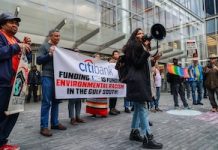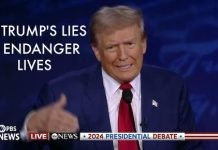
In 2023, rebel singer/songwriter Billy Bragg celebrated 40 years of making music and political activism with the release of a 14-CD box set titled, “The Roaring Forty.” Over his career, Billy has developed a unique sound, incorporating many genres of music into his songs, ranging from traditional folk to punk rock featuring both stirring protest and labor solidarity anthems, and deeply personal reflections on his own, sometimes tragic life experience.
Among the highlights of Billy’s career was collaborating with Woody Guthrie’s daughter Nora, and the band Wilco in the 1990s to record “Mermaid Avenue,” three albums of unheard lyrics written by the legendary radical American folk singer, set to new music.
Billy’s most recent album is titled, “A Million Things That Never Happened”— and he’s the author of the best-selling book, “Roots, Radicals & Rockers – How Skiffle Changed The World,” and “The Three Dimensions of Freedom.” Between The Lines’ Scott Harris spoke with Billy as he was preparing for the next leg of a U.S. tour, where he reflected on his career and the political activism that inspired many of his iconic songs of protest and solidarity.
BILLY BRAGG: I was politicized by Rock Against Racism in 1977 during punk rock. You know, I went along to the first big Rock Against Racism gig. The Clash were playing, Tom Robinson, Steel Pulse, X Ray Spex, and that kind of politicized me in that sense. But in 1984, I just put out my first album, it was kind of a solo singer/songwriter out of the punk mode, but also with some points of reference with the classic ’60s singer/songwriters who were also writing about political issues.
And I thought to myself, Well, you know, I fervently believe that music could change the world. And now I had an opportunity to find out if it can by — obviously, this was my fight. This was my class that was up against the wall here with the miners. And Margaret Thatcher was clearly my class enemy. So I was going to get involved in some way.
But as a musician who was just coming into his first flush of fame. I had an opportunity to use my platform to do something other than just sell records and T-shirts. So I embraced that struggle. I didn’t expect it to last for a year, but it included the year in which I first came to the United States of America in August 1984 and toured, opening for Echo and the Bunnymen.
And that introduced me to, oddly, Woody Guthrie, because you couldn’t really buy Woody’s records in the UK, I mean, I knew who he was and I knew his songs. I’d known them through cover versions and I was finally able to buy Woody’s records, but I was also introduced to the songs of Joe Hill, a Swedish-American union songwriter for the International Workers of the World, the IWW from the first decade or second decade of the 20th century.
And I’d never heard of Joe. And I got an album of his songs by Utah Phillips and bought it and took that home. And that kind of plugged me in to that tradition of union song. So I suddenly thought, well, you know, I could write a song like this to fit into the struggle that has gone on in my country.
So I borrowed the title from one of Joe Hill’s songs that was on that Utah Phillips album, There’s Power in a Union, and I borrowed the tune from I borrowed it from a song from the American Civil War Union Song which is alternatively known as the Battle Cry of Freedom or sometimes called Rally Around the Flag.
I was so pleased to find out years later that that tune was stolen from an English hymn, so I kind of found a cultural reappropriation. But that’s what folk music is. You take old tunes. I mean, Woody, that was one of the interesting things about Woody. Woody very seldom wrote his own tunes. He often wrote songs to previously existing tunes that everybody knew, so that he could sing his songs and everybody could join in. You know, he was that kind of busking kind of guy.
So in that kind of Woody tradition, I wrote There Is Power in a Union, and I’m pleased to say it resonated. It gave me the experience of going and playing in the coalfields in the north of England, in Scotland, in South Wales, forced me to start to try and articulate the views I had in a more ideological way than I had hitherto.
So that led me to write Between the Wars, Which Side are You On? Power in a Union, those kind of more ideological songs that I probably wouldn’t have written had it not been for my experience during the miners’ strike. So kind of the experience of the miners strike defined what most people think of as what Billy Bragg is a singer/songwriter, with a socialist politics who’s standing on a picket line singing songs.
And I do still do that, but it’s not the only thing I do. That’s only part of what I do.
SCOTT HARRIS: Through your years of writing and performing songs these four decades, you’ve understood more than most the power of music and the fight for social justice. And you’ve used that power in the writing of your songs. I’ve read that you don’t necessarily believe that music can change the world.
But it does have the power to communicate important political and deeply personal messages that can bring people together, as you just said a moment ago, and provide a sense of solidarity, like in a union or a strike or any of these moments in time where people come together and it’s powerful. Music is so powerful and it communicates in a different way than words. And I know you’ve you’ve articulated this in many ways. I wonder if you could just share with our audience the power you see and have used and experienced in music.
BILLY BRAGG: My sense of the power that music has is based on my own personal experience of Rocking Against Racism. I went to that gig, because I was against racism. But also, you know, the Clash were playing, as I mentioned, Tom Robinson. But when I got to the venue, we marched through East London to a park, Victoria Park in Hackney, there were 80,000 kids just like me.
And I realized that I was not alone in my concerns. From a gig, you can take a sense of communion, a sense of connection, a sense of solidarity around an issue that’s being articulated at that moment that fires you up to go away and put into practice your beliefs, that can recharge your activism.
And that’s my job every night. That’s why I’m trying to. Because I’ll tell you what, when I come off stage after our audience have all sung There’s Power in a Union with their fists in the air, my activism is really recharged, I’m 100 percent, you know, and my cynicism is temporarily kicked to the curb. And my job as well as entertaining people and sending them a T-shirt is to send them home with their activism recharged as well.
And I think that’s a much more, powerful thing than the idea of me singing a song is going to change anything.
Listen to Scott Harris’ in-depth interview with Billy Bragg (41:01) and see more articles and opinion pieces in the Related Links section of this page.
For the best listening experience and to never miss an episode, subscribe to Between The Lines on your favorite podcast app or platform.
Or subscribe to our Between The Lines and Counterpoint Weekly Summary.




